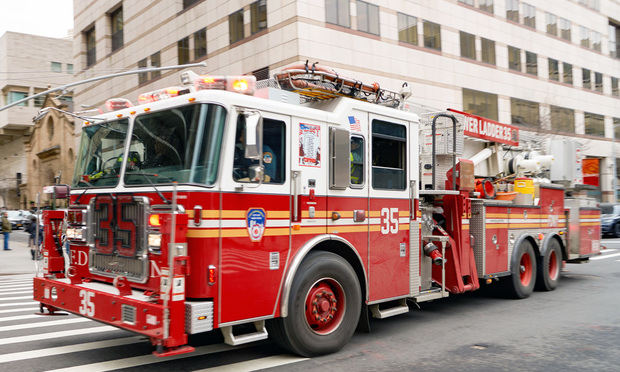Compliance With Industry Standards Insufficient in Products Liability Case, Superior Court Says
The split panel said the plaintiffs needed to have an expert testify that a proposed alternative design was safer, and not just that it met industry standards.
August 22, 2018 at 04:41 PM
4 minute read
 Photo: Sorbis/Shutterstock.com
Photo: Sorbis/Shutterstock.com
A group of firefighters claiming a siren damaged their hearing failed to provide enough evidence to show that a proposed alternative design was actually safer, the Pennsylvania Superior Court has ruled in an opinion that sheds light on how courts are treating the intersection of expert testimony and industry standard evidence in the wake of the seminal 2014 decision Tincher v. Omega Flex.
A split three-judge panel issued a precedential decision Aug. 20 in Dunlap v. Federal Signal saying the plaintiffs needed to have an expert testify that their proposed alternative design was safer than the sirens the defendants made, and that simply relying on the fact that the proposed design met industry standards was insufficient to allow the case to go forward.
“At issue are technical matters that are beyond the ken of ordinary persons and within the knowledge of expert witnesses available to the parties,” said Judge Mary Jane Bowes, who wrote the majority's 16-page opinion. The plaintiff's “proof that their proposed design met industry standard was not enough to establish a prima facie case that it was more effective for all users.”
The majority's 3-1 ruling hinged in part on an interpretation of the court's 2016 decision in Webb v. Volvo Cars of North America, which had held that Tincher did not overrule precedent indicating that a product's compliance with industry standards was irrelevant and inadmissible.
Bowes said Tincher did not hold that courts should disregard the rules outlined in Lewis v. Coffing Hoist Division and Gaudio v. Ford Motor, “The concern, identified in Lewis, that defective design could be widespread in the industry, and hence, evidence that a product comported with industry standards was not proof of non-defectiveness.”
However, in an eight-page dissent, Superior Court Judge Anne Lazarus said she disagreed with the majority's interpretation of Webb.
“I believe that, contrary to the majority's assertion, the Webb holding is narrow and does not sufficiently discuss the negligence and strict liability principles underlying the evidentiary rule barring governmental/industry standard evidence,” Lazarus said. “The Webb court acknowledges the necessity of additional post-Tincher cases discussing the negligence and strict liability principles underlying the re-establishment of a bright line rule definitively barring government/industry standard evidence.”
Tuesday's opinion in Dunlap marks the latest in only a handful of precedential opinions from Pennsylvania's appellate courts that interpret the meaning of the state Supreme Court's ruling in Tincher, which practitioners and trial courts have been grappling with since it came out nearly four years ago.
In late 2014, Tincher resulted in a landmark ruling by the Supreme Court that did away with the strict separation of negligence and strict liability principals. The decision specifically held that plaintiffs in products liability cases can pursue claims on either a risk utility or consumer expectation test. The decision also overruled Azzarello v. Black Brothers, which is a foundational opinion from 1978 that provided guidance on what questions juries should be allowed to consider and said proof that a product complied with industry standards had no place in a strict products liability case.
Dunlap involves a group of 247 firefighters who claim the sirens on their trucks were defective and caused hearing loss. The plaintiffs had produced an expert who said the siren could have been designed with a shield that would have redirected the sound to the front of the truck, which would have been safer for the firefighters.
The siren manufacturer, however, contended the alternative design would have failed to properly warn pedestrians and other motorists near the sides of the truck, meaning the proposed design was not safer for all users.
Bowes noted that the plaintiffs expert did not opine on how the alternative design would have impacted pedestrians and other motorists, but, instead, relied on the fact that the design would have met industry standards.
The trial court had tossed the case on summary judgment, saying the plaintiffs failed to meet their burden, and the Superior Court's majority affirmed.
Both Shawn Sassaman of Marc J. Bern & Partners, who is representing the plaintiffs, and Clem Trischler of Pietragallo, Gordon, Alfano, Bosick & Raspanti, who is representing the defendant, did not return a call seeking comment.
This content has been archived. It is available through our partners, LexisNexis® and Bloomberg Law.
To view this content, please continue to their sites.
Not a Lexis Subscriber?
Subscribe Now
Not a Bloomberg Law Subscriber?
Subscribe Now
NOT FOR REPRINT
© 2025 ALM Global, LLC, All Rights Reserved. Request academic re-use from www.copyright.com. All other uses, submit a request to [email protected]. For more information visit Asset & Logo Licensing.
You Might Like
View All
Litigating the Written Word: Parol Evidence Rule and the Gist of the Action Doctrine in Fraud Claims
6 minute read


Trending Stories
- 1Reviewing Judge Merchan's Unconditional Discharge
- 2With New Civil Jury Selection Rule, Litigants Should Carefully Weigh Waiver Risks
- 3Young Lawyers Become Old(er) Lawyers
- 4Caught In the In Between: A Legal Roadmap for the Sandwich Generation
- 5Top 10 Developments, Lessons, and Reminders of 2024
Who Got The Work
J. Brugh Lower of Gibbons has entered an appearance for industrial equipment supplier Devco Corporation in a pending trademark infringement lawsuit. The suit, accusing the defendant of selling knock-off Graco products, was filed Dec. 18 in New Jersey District Court by Rivkin Radler on behalf of Graco Inc. and Graco Minnesota. The case, assigned to U.S. District Judge Zahid N. Quraishi, is 3:24-cv-11294, Graco Inc. et al v. Devco Corporation.
Who Got The Work
Rebecca Maller-Stein and Kent A. Yalowitz of Arnold & Porter Kaye Scholer have entered their appearances for Hanaco Venture Capital and its executives, Lior Prosor and David Frankel, in a pending securities lawsuit. The action, filed on Dec. 24 in New York Southern District Court by Zell, Aron & Co. on behalf of Goldeneye Advisors, accuses the defendants of negligently and fraudulently managing the plaintiff's $1 million investment. The case, assigned to U.S. District Judge Vernon S. Broderick, is 1:24-cv-09918, Goldeneye Advisors, LLC v. Hanaco Venture Capital, Ltd. et al.
Who Got The Work
Attorneys from A&O Shearman has stepped in as defense counsel for Toronto-Dominion Bank and other defendants in a pending securities class action. The suit, filed Dec. 11 in New York Southern District Court by Bleichmar Fonti & Auld, accuses the defendants of concealing the bank's 'pervasive' deficiencies in regards to its compliance with the Bank Secrecy Act and the quality of its anti-money laundering controls. The case, assigned to U.S. District Judge Arun Subramanian, is 1:24-cv-09445, Gonzalez v. The Toronto-Dominion Bank et al.
Who Got The Work
Crown Castle International, a Pennsylvania company providing shared communications infrastructure, has turned to Luke D. Wolf of Gordon Rees Scully Mansukhani to fend off a pending breach-of-contract lawsuit. The court action, filed Nov. 25 in Michigan Eastern District Court by Hooper Hathaway PC on behalf of The Town Residences LLC, accuses Crown Castle of failing to transfer approximately $30,000 in utility payments from T-Mobile in breach of a roof-top lease and assignment agreement. The case, assigned to U.S. District Judge Susan K. Declercq, is 2:24-cv-13131, The Town Residences LLC v. T-Mobile US, Inc. et al.
Who Got The Work
Wilfred P. Coronato and Daniel M. Schwartz of McCarter & English have stepped in as defense counsel to Electrolux Home Products Inc. in a pending product liability lawsuit. The court action, filed Nov. 26 in New York Eastern District Court by Poulos Lopiccolo PC and Nagel Rice LLP on behalf of David Stern, alleges that the defendant's refrigerators’ drawers and shelving repeatedly break and fall apart within months after purchase. The case, assigned to U.S. District Judge Joan M. Azrack, is 2:24-cv-08204, Stern v. Electrolux Home Products, Inc.
Featured Firms
Law Offices of Gary Martin Hays & Associates, P.C.
(470) 294-1674
Law Offices of Mark E. Salomone
(857) 444-6468
Smith & Hassler
(713) 739-1250





